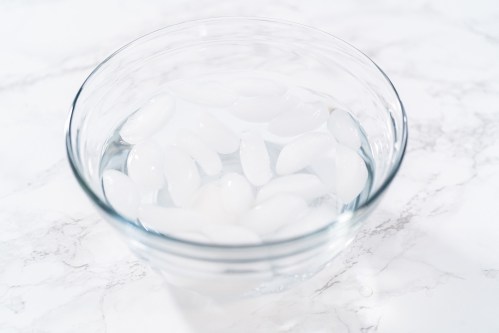How Submerging Your Face in a Bowl of Ice Water Helps Calm Anxiety in Seconds
Submerging your face in ice water is a random, albeit refreshing, hack to relieve anxiety by activating the body’s mammalian diving reflex. Here’ s how it works.

Social media (TikTok, in particular) is chock-full of hacks for literally everything. Some are totally weird and ineffective. Some are not recommended by experts and should be avoided (cough cough, bad skin-care hacks). And others are genuinely pretty helpful. Case in point: submerging your face in ice water.
Experts in This Article
triple board-certified clinical and forensic neuropsychologist
This random—albeit refreshing—technique helps relieve anxiety by activating the body’s mammalian diving reflex. And, according to the internet, it can also help relieve nausea and hangovers. Read on to learn more about it and how to try the ice water trick for yourself.
What is the mammalian diving reflex?
The diving reflex consists of breathing cessation (apnea), a dramatic slowing of heart rate (bradycardia), and an increase in peripheral vasoconstriction, explains Judy Ho, PhD, a clinical and forensic neuropsychologist. “When activated in emergency situations where a person might drown, it is thought to conserve vital oxygen stores and maintain life by redirecting activity to the two organs most essential for life—the heart and brain,” she adds. In other words, the body physiologically responds to cold water submersion by stopping your breathing and slowing down your heart rate to conserve energy for survival.
That said, when using this hack as a coping technique, Dr. Ho emphasizes that the goal is not to significantly stop your breathing or lower your heart rate. Instead, brief experiences with cold water or cold objects, particularly when the cold hits the face and nose, sends a message to the vagus nerve, which manages the parasympathetic nervous system known as the rest and relaxation system.
“When the parasympathetic nervous system is activated, it regulates and slows down your heart rate and breathing and leads to an overall feeling of calm for many people,” Dr. Ho explains. “It also signals to your brain and body that there is no emergency going on here and therefore helps you to relax and reset from a stressful situation.”
The best part of this coping technique is that it’s very easy to do—all you need is a bowl, water, and ice. And, Dr. Ho says it works within seconds to minutes to help calm you down. Keep scrolling to learn how to do it.
How to activate the diving reflux with ice water
The instructions are pretty straightforward: Start by filling a bowl (ideally one that can fit your entire face) with water and ice. Then submerge your face in the ice water for 10–15 seconds. Repeat as needed. Most importantly, be gentle with yourself. “Don’t submerge yourself to the point where you feel like you can’t breathe or are choking,” Dr. Ho says.
If submerging your face in ice water doesn’t feel comfortable or if it’s just not practical to do at the time (like if you’re out and about), there are other ways to activate the diving reflex. Dr. Ho recommends placing a small baggie with ice cubes or an ice-cold towel on your face. Splashing cold water on your face will also do the trick. Or better yet, take a cold shower. And if you’re in a pinch, rubbing ice cubes on your wrists and temples can also bring some relief.
Dr. Ho suggests using this technique whenever you feel overwhelmed, under extreme stress, or feel anxiety, or a panic attack developing. And even if you’re not feeling particularly stressed or anxious, she adds that it can be a nice little self-care treat in the middle of a busy day.
Another thing to note: Although this trick can help most people feel better, some folks should take precautions or avoid it altogether. In particular, Dr. Ho says if you have a heart disorder (or a family history of heart conditions), low heart rate due to medication, difficulty breathing, a phobia of water, or other major medical problems, consult with a medical professional first before trying this technique for yourself.
Sign Up for Our Daily Newsletter
Get all the latest in wellness, trends, food, fitness, beauty, and more delivered right to your inbox.
Got it, you've been added to our email list.










